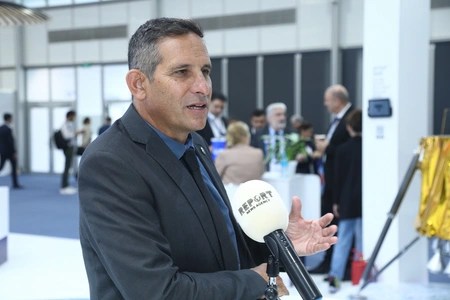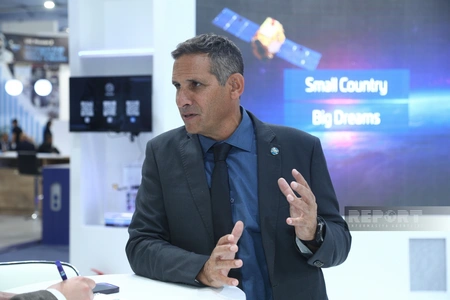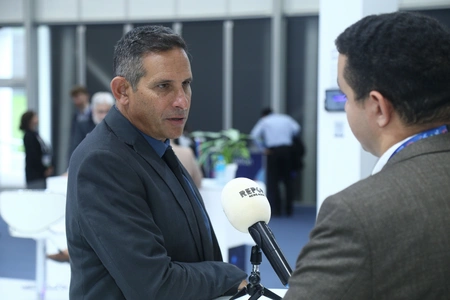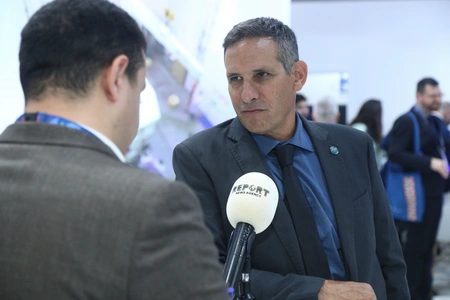Uri Oron: Azerbaijan should have certain assets in space to improve people’s lives
- 31 October, 2023
- 06:44
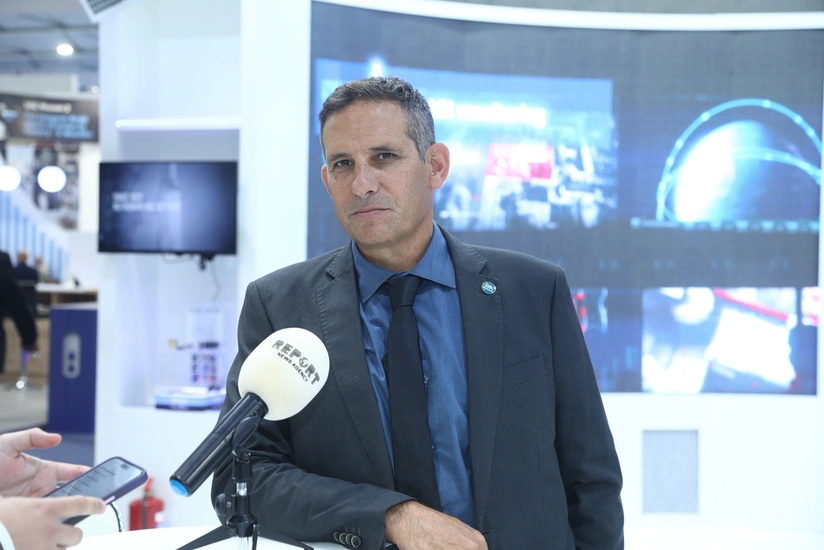
In October of this year, Azerbaijan again hosted the International Astronautical Congress after 50 years. This is an indicator of the high attention paid at the international level to the important achievements of Azerbaijan in the fields of modern technologies, digital development, and the construction of the space industry. Holding this International Congress, which is one of the most prestigious events worldwide, for the second time in Azerbaijan will also create unparalleled opportunities for the development of the space industry in the country, the expansion of cooperation with the international space community and the International Astronautical Federation (IAF), which represents it, as well as closer integration into the global space industry.
Director of the Israel Space Agency (ISA), Uri Oron, spoke about the possibilities of cooperation between Azerbaijan and Israel in an interview with Report. In his interview, he talked about the agreement signed between the Azerbaijan Space Agency (Azercosmos) under the Ministry of Digital Development and Transport and IAI (Israel Aerospace Industries) on the launch of Azerbaijan’s 4th satellite into orbit. He touched on issues related to the future of the space industry.
The report presents this interview.
Mr. Uri Oron, you participated in the 74th International Astronautical Congress held in Baku, and first of all, we would like to know your impressions about this congress and our country.
So first of all, I think it's a great congress. There are a lot of people, a lot of meetings, and it's been arranged very well. Everything runs smoothly.
So, in that regard, my impression is very good from Baku, from Azerbaijan, and from the conference. And that's great. I haven't had the opportunity to travel a lot or to see Baku too much.
But Baku is an amazing city. I didn't expect to see such modernization on the streets of Baku. In places that are very clean, people are keen to help. So, it's a great place.

As part of this congress, a new contract was signed between Azercosmos and IAI on launching a new satellite into orbit. What will this agreement bring to the parties?
So today, you cannot run a modern country without assets in space. The fact that you are above earth, but you can see what's going on down there in a very, very detailed way, gives you a lot of relevant information that cannot be reached aside from space. So, as a modern country, Azerbaijan must have some assets in space in order to improve the lives of the people down here.
Those two satellites are going to bring data, earth, and observation information about the relevant places that will enable decision-makers, research, and activities to be done in a much more efficient way. Without it, you'll be a little bit more blind, but with those satellites, you'll see much better. And as a human being, when you see better, you can make things much better. That's the basic idea. The gain for Azerbaijan is this knowledge. The strength of Israel is the partnership between the country and industry. Of course, make money.
Another important aspect of this contract is the preparation of the satellite in Azerbaijan. If the satellite is developed in Azerbaijan, what will be Israel’s contribution to this process?
Israel had a lot of experience in building, planning, launching, and operating satellites. This experience and knowledge were built on years of experience. What we are trying to do together here right now is build that experience in Azerbaijan. Without such an experience, you won't be able to build it by yourself. So, the basic idea is not just to sell those satellites. The basic idea is to build knowledge. Build knowledge and experience that will enable you in the future to build such satellites on your own. Because again, the way I see space, it is a vital component of every nation. Once you put your hands on those capabilities, you'll be able to operate by yourself. You're going to grow the economy, and that's what you see in other places in the world. But you need to start somewhere. Okay? Now, Azerbaijan does not start anywhere, but cooperating with Israel will bring it much faster to a much higher level.
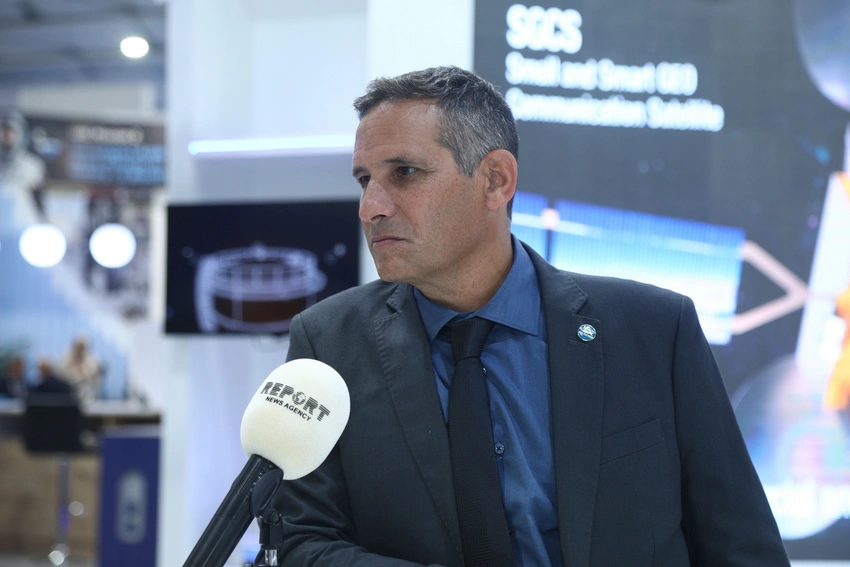
In recent years, we have often come across "space business", "space entrepreneurship," and similar expressions. What does it mean, how can the business sector participate in the process, and what will be their profit?
So, the easiest way to explain it is to bring you back to the middle of the nineties of the previous century. There was a time without the internet.
It took the world, it took companies, and it took entrepreneurs more than a decade to understand the potential of the internet.
Nowadays, we are in a totally different era in space. Space is much more accessible, and accessing space is cheaper. Okay? So basically, a new domain is open, exactly like happened in the middle of the nineties, when the new domain of the Internet was open. So, you cannot imagine exactly what's going to happen in 2000 and 2010 regarding the internet. But this is what's happening in space. So, the way you need to look at it is okay; we are building an infrastructure and trying to educate the market, but eventually entrepreneurs and entrepreneurship will grow from that domain.
So, we are right now in the stage of taking those entrepreneurs and those startups to the place of space. Look at space; it's going to grow, and it's going to be a vital component of your life.
There are opportunities over there. In order to do that, you need to educate the market, you need to bring them infrastructure, and you need to help them because it's still infrastructure. That's what's happening in Israel; that's what's happening in other places in the world, and it could happen in Azerbaijan as well.

Speakers at the 74th International Astronautical Congress held in Baku expressed the interesting opinion that the states are currently the main financial source of space research. What do you think should be done so that the business sector comes to the fore in this type of research and becomes the main investor?
So, it's actually already started. When you look at the numbers of the change in the influence of the private sector over the years on the space sector, you see tremendous growth in the money that the private sector is putting into space, and it will keep on growing from year to year.
We see that here, first in the US and then in other places. So, when the risk is reduced and there is less risk, others will be able to go into this market. So, the risk could be reduced, and the monetized process will be much more efficient. In other words, yes, you will know how to make money out of space. Companies are already there. SpaceX, Axiom, and Planet are already there.
But now it's only the big ones. That's why governments are so important for the time being. But I guess within the ten years’ time frame when we will stand or sit here in Baku, ten years from now, you will see less government spending on space and more and more private spending on space because it will be monetized. Countries will start, companies will start to make money out of it and then those entrepreneurs and investors will come in. So, it's a process; it's going to take a while, but it's going to happen for sure.
Today, Israel has many years of experience in the space field. Nowadays, almost everyone dreams of going to space. What should they do for this? What is your suggestion or recommendation?
Right now, I can offer you a dream and inspiration. You need to dream, and you need to be inspired to reach the moon. Now, what you can see with bereshit with space initiative and with others that even reach the moon is not a dream anymore. You're going to see it coming more and more and more and more. You need to find the right person with the right dreams and the right-driven force to move forward. But it could happen to everybody. If it happened in Israel, it could happen to everybody. So, what I offer you right now is a dream. But in order to reach places, you need to start walking. Start walking towards that goal.
